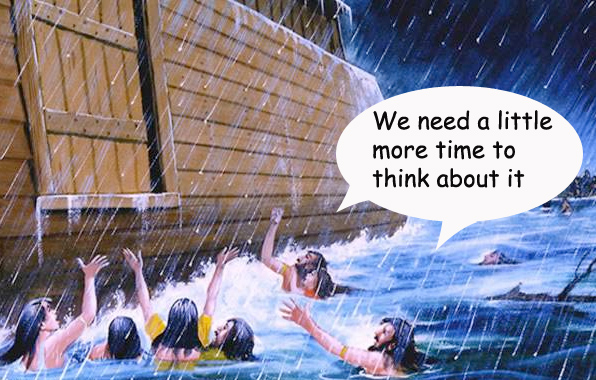
December 28, 2010
Dispensation 2 – A Flood of Knowledge
 The dispensations are God’s process of contrastively showing that His plan for humanity is right.
The dispensations are God’s process of contrastively showing that His plan for humanity is right.
The first dispensation asked the question, – if man was completely innocent; with no knowledge of the long-term consequences of his actions (good and evil), would he choose to continue to rely on God for moment by moment direction, or would he choose his own way?
As we saw, Adam and Eve disobeyed God and chose to gain knowledge of the long-term. And when they were confronted about their actions they chose comparative thinking and death instead of contrastive thinking, which would have led to repair and life.
The rules of dispensation 2
Lack of knowledge did not lead to man choosing God. The next logical step in the contrastive process would be to create the opposite situation.
Thus the Second Dispensation asked the question – if man was given a long time to gain an abundance of knowledge, would he use that knowledge to choose God?
We know this dispensation was not successful because . . . well, there was that big ol’ flood and all.
But lets examine the events that led up to the Flood.
The people multiplied…
Although Adam and Eve failed to keep God’s commandment not to eat the forbidden fruit, they did obey Him when He told them to be “fruitful and multiply”. Right after they got kicked out of Eden, the first couple put on some Marvin Gaye and started cranking out kids.
The first several generations after Adam and Eve lived a LONG time. Looking at the genealogies in Genesis chapter 5, we see that their descendants, on average, lived to be well over 700 years old.
If the people during this time averaged one new birth every 10 years, and only actively produced children for 200 of their 700 years (which is VERY conservative), in the 1,656 years between the fall of man and the flood, the population of the world could have easily been in the tens of millions.
The pre-Flood folk had a lot of time to accumulate knowledge and a lot of people to learn from and compound that knowledge. What was the effect of all this knowledge? Did man pursue God? Did abundant knowledge lead to an increase in goodness?
…and so did the evil
And God saw that the wickedness of man was great in the earth, and that every imagination of the thoughts of his heart was only evil continually. And it repented the LORD that he had made man on the earth, and it grieved him at his heart – Genesis 6:5-6 KJV
Increased time and knowledge led to man becoming MORE evil! The more knowledge man got, the worse he became. The pre-Flood generations continued the pattern set by Adam and Eve. When they gained knowledge, they chose to be comparative instead of contrastive. They repeated Original Sin!
Since comparative thinking leads to brain damage, imagine the effects of hundreds of years of compounded brain damage. The result was that by the end of the second dispensation every thought that people had was evil! They were irredeemably brain damaged!
Adam’s first son, Cain, in a fit of contrastive thinking, murdered his brother Abel. Five generations later, murdering people had reached the stage where Cain’s descendent Lamech thought it was something cool to brag about!
The great flushing
This dispensation was obviously a failure. Instead of leading man to God, excessive time and knowledge had the opposite effect. It would have been unjust of God to continue to allow man such longevity and knowledge if the result was total corruption.
God justly ended this dispensation by curtailing man’s lifespan, wiping out the corrupt generation, and starting over with the only guy left on earth who was still on His side.
And of course we’re all familiar with the story of the Great Flood. God commanded Noah to build the Ark, take his family and a sampling of land animals on it, and then God (literally) opened up the flood gates and performed the first world-wide deep cleaning.
Why did this dispensation fail? The people obviously had knowledge of God. God apparently spoke verbally to people during this time as He did with Cain, plus Adam lived for 930 years after the fall, so he would have been around for most of this dispensation as another source of knowledge.
The pre-Flood generations had plenty of knowledge of God, but they did not act on that knowledge. They never let that knowledge serve as a guide in order to be better, to grow, to become more righteous and just – to choose God.
They didn’t know enough to believe
Apparently, they had knowledge of God, but they did not believe in God, they only believed in their own knowledge – they had knowledge of the long-term, but they did not believe that God would always be completely right and just in the future (the long term), so they did not follow Him. They chose their own way.
They failed because they did not believe. They were missing something. They lacked the thing that serves as a bridge between knowledge and belief. They lacked FAITH.
Faith is without a doubt an extremely important part of Christian philosophy (this blog would not have a title without it). Although it is one of the terms that the Bible gives a direct definition for, it is still very misunderstood. In the next post we will begin an examination of faith.
Related Podcasts:
Remember to subscribe to this blog to receive new posts when they are published
